

3D ancient bone analysis rewrites a critical chapter of human history. Archaeologists have long linked ancient tool use to the beginning of human history.
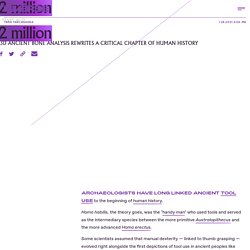
Homo habilis, the theory goes, was the "handy man" who used tools and served as the intermediary species between the more primitive Australopithecus and the more advanced Homo erectus. Some scientists assumed that manual dexterity — linked to thumb grasping — evolved right alongside the first depictions of tool use in ancient peoples like Australopithecus, who went extinct around 2.95 million years ago. But what if scientists got the timeline wrong? This altered timeframe suggests the ability is uniquely associated with later-arising species and possibly the catalyst for the gradual development of complex culture.
How they did it — Previous archaeological studies on manual dexterity — the ability to grasp objects — compared ancient people's bones to the bones of modern-day humans, assuming that the two would share similar evolutionary features. Neanderthals made two epic invasions of Siberia, says new study. At the fascinating Chagyrskaya cave the remains of at least five Neanderthal adults and four children were found.
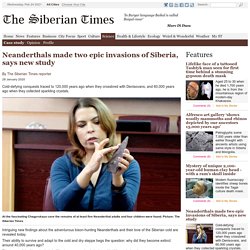
Could Neanderthals Speak? The Ongoing Debate Over Neanderthal Language. Did Neanderthals have language?
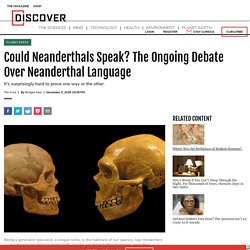
Before trying to answer that, I should admit my bias: I’m team Neanderthal. As an anthropologist who studies our evolutionary cousins, I’ve seen plenty of evidence suggesting Neanderthals were competent, complex, social creatures. In light of their apparent cognitive abilities, I’m inclined to believe they had language. But I can’t prove it, and no one else can, either. To date, there’s no evidence that Neanderthals developed writing, so language, if it existed, would have been verbal. The best researchers can do is to analyze Neanderthal fossils, artifacts and genes, looking for physical and cognitive traits considered necessary for language.
Clarifying the Question. Religion in the Ancient World. Religion (from the Latin Religio, meaning 'restraint,' or Relegere, according to Cicero, meaning 'to repeat, to read again,' or, most likely, Religionem, 'to show respect for what is sacred') is an organized system of beliefs and practices revolving around, or leading to, a transcendent spiritual experience.
There is no culture recorded in human history which has not practiced some form of religion. In ancient times, religion was indistinguishable from what is known as 'mythology' in the present day and consisted of regular rituals based on a belief in higher supernatural entities who created and continued to maintain the world and surrounding cosmos.
Timeline: Human Evolution. By John Pickrell 55 million years ago (MYA) First primitive primates evolve.
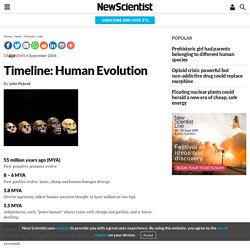
Centuries-old Inca offering discovered in sacred lake. Lake Titicaca was a sacred space to the ancient Andean empire of the Inca, which at its height in the early 16th century controlled territory from modern-day Colombia to Chile.
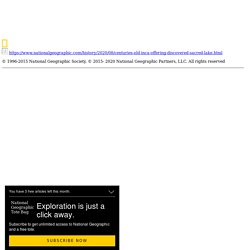
There's No Scientific Basis for Race—It's a Made-Up Label. This story is part of The Race Issue, a special issue of National Geographic that explores how race defines, separates, and unites us.
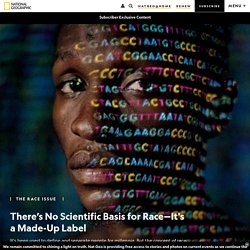
In the first half of the 19th century, one of America’s most prominent scientists was a doctor named Samuel Morton. Morton lived in Philadelphia, and he collected skulls. He wasn’t choosy about his suppliers. He accepted skulls scavenged from battlefields and snatched from catacombs. One of his most famous craniums belonged to an Irishman who’d been sent as a convict to Tasmania (and ultimately hanged for killing and eating other convicts).
Tools and voyages suggest that Homo erectus invented language. What is the greatest human technological innovation?
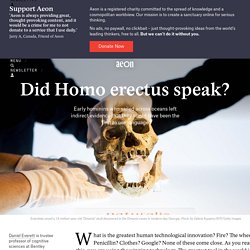
Fire? The wheel? Penicillin? Clothes? Google? To discover the answers to these questions, we need to travel back in time at least 1.9 million years ago to the birth of Homo erectus, as they emerged from the ancient process of primate evolution. Garrett PAPS 2018. Billion-Year-Old Algae and Newer Genes Hint at Land Plants’ Origin. Around 500 million years ago — when the Earth was already a ripe 4 billion years old — the first green plants appeared on dry land.
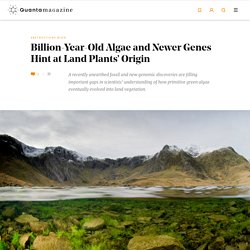
Precisely how this occurred is still one of the big mysteries of evolution. Before then, terrestrial land was home only to microbial life. The first green plants to find their way out of the water were not the soaring trees or even the little shrubs of our present world. They were most likely soft and mossy, with shallow roots and few of the adaptations they would later evolve to survive and thrive on dry land. And though scientists agree that these plants evolved from some kinds of seaweed, we know comparatively little about those green algal ancestors. The Old Way: A Story of the First People - Kindle edition by Elizabeth Marshall Thomas. Politics & Social Sciences Kindle eBooks @ Amazon.com.
The Tangled Tree: A Radical New History of Life: David Quammen: 9781476776637: Amazon.com: Books. Early Earth may have been a 'waterworld' Kevin Costner, eat your heart out.

New research shows that the early Earth, home to some of our planet's first lifeforms, may have been a real-life "waterworld"— without a continent in sight. The study, which appears March 2 in Nature Geoscience, takes advantage of a quirk of hydrothermal chemistry to suggest that the surface of Earth was likely covered by a global ocean 3.2 billion years ago.
Oral Tradition - The Oldest True Stories in the World.